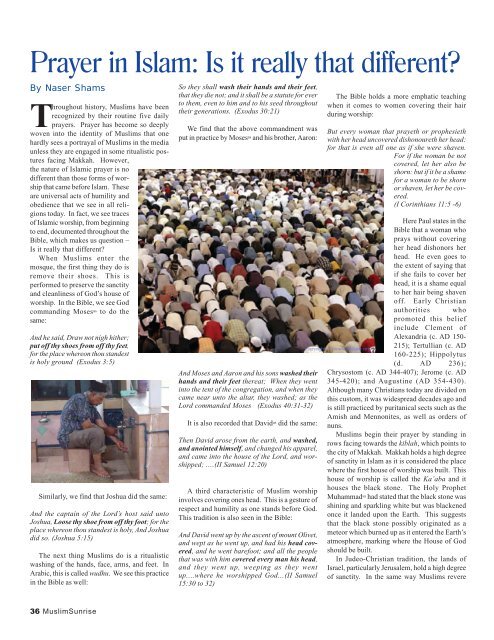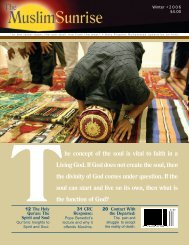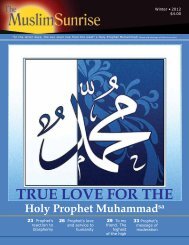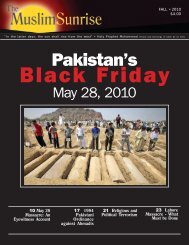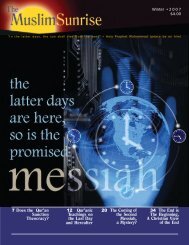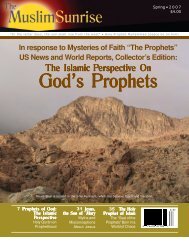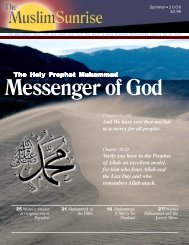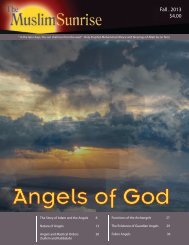Create successful ePaper yourself
Turn your PDF publications into a flip-book with our unique Google optimized e-Paper software.
Prayer in Islam: Is it really that different?By Naser ShamsThroughout history, <strong>Muslim</strong>s have beenrecognized by their routine five dailyprayers. Prayer has become so deeplywoven into the identity of <strong>Muslim</strong>s that onehardly sees a portrayal of <strong>Muslim</strong>s in the mediaunless they are engaged in some ritualistic posturesfacing Makkah. However,the nature of Islamic prayer is nodifferent than those forms of worshipthat came before Islam. <strong>The</strong>seare universal acts of humility andobedience that we see in all religionstoday. In fact, we see tracesof Islamic worship, from beginningto end, documented throughout theBible, which makes us question –Is it really that different?When <strong>Muslim</strong>s enter themosque, the first thing they do isremove their shoes. This isperformed to preserve the sanctityand cleanliness of God’s house ofworship. In the Bible, we see Godcommanding Moses as to do thesame:And he said, Draw not nigh hither;put off thy shoes from off thy feet,for the place whereon thou standestis holy ground (Exodus 3:5)Similarly, we find that Joshua did the same:And the captain of the Lord’s host said untoJoshua, Loose thy shoe from off thy foot; for theplace whereon thou standest is holy, And Joshuadid so. (Joshua 5:15)<strong>The</strong> next thing <strong>Muslim</strong>s do is a ritualisticwashing of the hands, face, arms, and feet. InArabic, this is called wudhu. We see this practicein the Bible as well:So they shall wash their hands and their feet,that they die not; and it shall be a statute for everto them, even to him and to his seed throughouttheir generations. (Exodus 30:21)We find that the above commandment wasput in practice by Moses as and his brother, Aaron:And Moses and Aaron and his sons washed theirhands and their feet thereat; When they wentinto the tent of the congregation, and when theycame near unto the altar, they washed; as theLord commanded Moses (Exodus 40:31-32)It is also recorded that David as did the same:<strong>The</strong>n David arose from the earth, and washed,and anointed himself, and changed his apparel,and came into the house of the Lord, and worshipped;….(II Samuel 12:20)A third characteristic of <strong>Muslim</strong> worshipinvolves covering ones head. This is a gesture ofrespect and humility as one stands before God.This tradition is also seen in the Bible:And David went up by the ascent of mount Olivet,and wept as he went up, and had his head covered,and he went barefoot; and all the peoplethat was with him covered every man his head,and they went up, weeping as they wentup….where he worshipped God…(II Samuel15:30 to 32)<strong>The</strong> Bible holds a more emphatic teachingwhen it comes to women covering their hairduring worship:But every woman that prayeth or prophesiethwith her head uncovered dishonoureth her head:for that is even all one as if she were shaven.For if the woman be notcovered, let her also beshorn: but if it be a shamefor a woman to be shornor shaven, let her be covered.(I Corinthians 11:5 -6)Here Paul states in theBible that a woman whoprays without coveringher head dishonors herhead. He even goes tothe extent of saying thatif she fails to cover herhead, it is a shame equalto her hair being shavenoff. Early Christianauthorities whopromoted this beliefinclude Clement ofAlexandria (c. AD 150-215); Tertullian (c. AD160-225); Hippolytus(d. AD 236);Chrysostom (c. AD 344-407); Jerome (c. AD345-420); and Augustine (AD 354-430).Although many Christians today are divided onthis custom, it was widespread decades ago andis still practiced by puritanical sects such as theAmish and Mennonites, as well as orders ofnuns.<strong>Muslim</strong>s begin their prayer by standing inrows facing towards the kiblah, which points tothe city of Makkah. Makkah holds a high degreeof sanctity in Islam as it is considered the placewhere the first house of worship was built. Thishouse of worship is called the Ka’aba and ithouses the black stone. <strong>The</strong> Holy ProphetMuhammad sa had stated that the black stone wasshining and sparkling white but was blackenedonce it landed upon the Earth. This suggeststhat the black stone possibly originated as ameteor which burned up as it entered the Earth’satmosphere, marking where the House of Godshould be built.In Judeo-Christian tradition, the lands ofIsrael, particularly Jerusalem, hold a high degreeof sanctity. In the same way <strong>Muslim</strong>s revere36 <strong>Muslim</strong><strong>Sunrise</strong>


